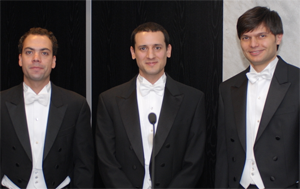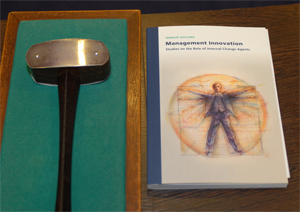Innovating management – how leaders can change the work of managers
Innovation in managerial practices, processes and structures has important implications for what people within the organisation do, how they relate to each other, and how their efforts are aligned towards achieving organisational goals. So managers should have a key role as the central ‘internal change agents’, capable of pursuing and implementing management innovation within firms, according to new research by Ignacio Vaccaro.
 Internal change agents can recognise opportunities to pursue management innovation, as well as take the lead in gathering and implementing the necessary organisational resources to ensure its success. In his PhD thesis Management Innovation: Studies of the role of Internal Change Agents, Ignacio Vaccaro studies the role of internal change agents spanning several hierarchical levels: from chief executive officers to top management teams and self-managing teams.
Internal change agents can recognise opportunities to pursue management innovation, as well as take the lead in gathering and implementing the necessary organisational resources to ensure its success. In his PhD thesis Management Innovation: Studies of the role of Internal Change Agents, Ignacio Vaccaro studies the role of internal change agents spanning several hierarchical levels: from chief executive officers to top management teams and self-managing teams.
The studies reported in his dissertation suggest an important role for internal change agents in the pursuit of management innovation by displaying a wide spectrum of leadership traits, articulating a compelling vision, providing an environment conducive to change and supporting the implementation of new practices, processes and structures.
First, the leadership behaviour of CEOs was found to be conducive to management innovation, though this relationship was contingent upon the size of the organisation. The larger the organisation, the more relevant it became for the CEO to exert a leadership behaviour that is considerate, inspirational, and intellectually stimulating.
Second, at the level of the top management team (TMT), teams whose members have different sets of expertise and backgrounds are better suited for the pursuit of management innovation. According to Vaccaro, this is particularly true when teams also show a high degree of social integration (i.e. when they act like a real team), although it was less important when the environment was particularly uncertain. Additionally, TMTs that sought to obtain advice and knowledge from within their organisation were better suited to enabling changes in management practice.
Finally, Vaccaro reports on a case study carried out at a DSM anti-infectives plant. There, the study of self-managing teams – a management innovation based on teams with a great degree of autonomy able to organise their work in the way they think best – provides insights into how different internal change agents at different hierarchies can influence the pursuit of new ways of managing through leadership behaviour, the exchange of knowledge between different constituencies and the trust within and between the different teams. This case study also suggests that potential synergies exist between technological and management innovation, underscoring the need to consider changes in what is produced next to changes in how the work of management is performed.
Ignacio Vaccaro defended his dissertation on November 4, 2010. His promoters were Prof. Dr. ing. Frans Van Den Bosch, Professor of Management Interfaces between Organisations and Business, Prof. Dr. Henk Volberda, Professor of Strategic Management and Business Policy, and Prof. Dr. Justin Jansen, Professor of Corporate Entrepreneurship. Other members of the Doctoral Committee were Prof. Dr. Fariborz Damanpour from the Rutgers Business School and Dr. Susan Hill, from the London School of Economics.
About Ignacio Vaccaro
Ignacio Vaccaro (Buenos Aires, 1980) is a graduate from the research master programme of the Erasmus Research Institute of Management (ERIM). Prior to that, he obtained a graduate degree in Strategic Management and an undergraduate degree in International Business Administration, both from the Rotterdam School of Management, Erasmus University. In his research, Ignacio explores the role of internal change agents in promoting and implementing management innovation in firms. In doing this he has collaborated with Royal DSM N.V. to study the development and replicability of a management innovation first introduced in one of their plants in Delft. His research has been presented at several international conferences including the Academy of Management Annual Meeting, Strategic Management Society Conference, the European Group for Organisational Studies Colloquium and the European Academy of Management (EURAM) Annual Conference where, in the 2010 edition, he also chaired the Strategic Management Special Interest Group. In addition, one of the chapters in his dissertation will be published in a forthcoming issue of the Journal of Management Studies. Next to his research, he taught at both undergraduate and executive programmes.
Ignacio Vaccaro currently works as a consultant at BTS in Amsterdam.
Abstract of ‘Management Innovation’
 One of the fundamental tenets of strategic management is that innovation can help organisations outperform their competitors. While technological innovation has been predominant in research, less attention has been given to management innovation, which addresses changes in the way managerial work itself is performed through the adoption of new practices, processes and structures.
One of the fundamental tenets of strategic management is that innovation can help organisations outperform their competitors. While technological innovation has been predominant in research, less attention has been given to management innovation, which addresses changes in the way managerial work itself is performed through the adoption of new practices, processes and structures.
This dissertation identifies and investigates the role of managers as the central internal change agents capable of enabling the pursuit of management innovation within firms. In doing so, the role of internal change agents spanning several hierarchical levels is studied: chief executive officers, top management teams, and self-managing teams.
The studies reported in this dissertation suggest a key role for internal change agents in the pursuit of management innovation by displaying a wide spectrum of leadership traits, articulating a compelling vision, providing an environment conducive to change and supporting the implementation of new practices, processes and structures. This dissertation also suggests that potential synergies exist between technological and management innovation, underscoring the need to consider changes in what is produced next to changes in how the work of management is performed.


